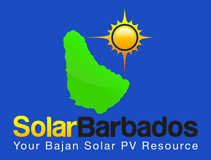
Photo credit: Barbados Today and Williams Solar
Barbados continues to maintain a leadership position in solar energy within the Caribbean. Building on a successful Renewable Energy Rider program which has seen 9MW of distributed solar PV installed, the electricity market has finally opened up to independent power producers (IPPs) to develop utility scale solar projects. This is the first time in over 100 years that an entity other than the Barbados Light and Power Company could generate electricity.
The Electric Light and Power Act 2013 (ELPA) is “an Act to revise the law relating to the supply and use of electricity, to promote the generation of electricity from sources of renewable energy, to enhance the security and reliability of the supply of electricity and to provide for related matters”
Being cognizant of improvements in power generation technology and aiming to reduce the Bds$800 million fuel import bill (50% of which is used to generate electricity) the government passed this new Act. It is intended to promote the generation of electricity from renewable energy sources and allows independent power producers to supply electricity in addition to the Barbados Light and Power Company.
The Electric Light and Power Act, 2013 was passed in parliament in December 2013 and amended in April 2015. It replaces the original 116 year old Electric Light and Power Act which was passed in 1899. The Act could not come into full effect until after an Intermittent Renewable Energy Penetration Study was conducted to determine the capacity level limits for central solar PV and wind. The findings were released and reviewed, and on May 4th, 2015 the new Act was proclaimed and became official.
Key points of ELPA
- Initially, 20MW of utility solar PV and 15MW of utility wind capacity are available
- IPPs interested in supplying electricity will need to apply for and be issued with a licence
- Once a licence is issued, BL&P will facilitate grid interconnection
- Power purchase agreement (PPA) price is to be negotiated with BL&P and approved by the regulator (Fair Trading Commission)
ELPA is the start of a new era of electricity generation in Barbados. It brings with it not only environmental benefits but financial benefits for local and international investors who seize this opportunity to invest in the future of the island’s power generation.
Are you a prospective solar developer or potential investor in the Barbados solar market? The Barbados Solar PV Market Insight will provide the necessary information to enable strategic business decisions.


Pingback: 10MW solar farm to be built in Barbados
What is the difference between (a) The Annual fee and (B) the Renewal of License fee in the ELPA Fee Schedule Page 2. Please explain?
The Annual fee is paid each year whereas the Renewal of License fee is only paid when the ELPA license needs to be renewed. E.g If a system which is planned to be operated for 20 years has a license which is valid for a period of 10 years, each year they will pay the Annual fee but the Renewal fee will only be paid at the end of year 10 to renew for the second 10 year period.